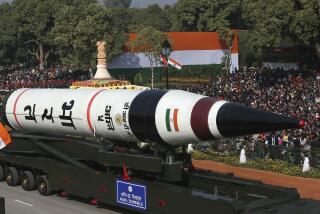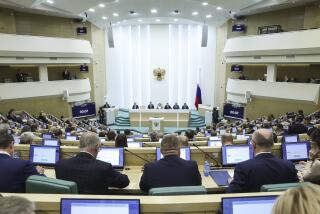India Conducts 3 Underground Nuclear Tests
- Share via
NEW DELHI — The Indian government exploded a hydrogen bomb Monday, shunning international pressure and threatening to drag South Asia into a dangerous and prolonged confrontation.
Indian Prime Minister Atal Behari Vajpayee announced in an evening news conference here that this country’s scientists had conducted three underground atomic tests--the country’s first since 1974--in a desert laboratory 300 miles southwest of the capital. One of those tests, Vajpayee said, involved the detonation of a thermonuclear device, the country’s first.
Vajpayee, India’s prime minister for less than three months, confirmed his nation’s nuclear capacity and said he had ordered the tests to safeguard India’s security. But the move brought swift condemnation from around the world--and angry, ominous threats from India’s main rival.
Pakistan, which has fought three wars with India since 1947, hinted strongly that it would soon test its own nuclear bomb--and match India step for step. China, which maintains a substantial nuclear arsenal and has conducted tests in recent months, stayed silent after Monday’s tests but is coming off a week of some of its worst relations with India in more than a decade.
The White House condemned India’s nuclear tests, which are all but certain to trigger a range of sanctions, including a suspension of millions of dollars in direct U.S. aid and a possible end to billions of dollars in new loans from international agencies.
Japan, Australia and New Zealand today also strongly criticized the tests, wire services reported. All three said they had or planned to recall their ambassadors. In Japan, India’s largest donor, some officials called for a suspension of aid.
The tests seemed likely to give rise to a period of uncertainty in a region that many analysts regard as the most likely to witness a nuclear exchange.
Neither India nor Pakistan has signed the Nuclear Non-Proliferation Treaty or the Comprehensive Test Ban Treaty--landmark efforts at arms control that have been endorsed by more than 100 countries.
While only five countries--the U.S., Russia, Britain, France and China--had until now openly declared their nuclear capabilities, several, including India and Pakistan, were thought to possess the requisite technology to build nuclear bombs.
India is believed to have had the capability to assemble several nuclear weapons since the mid-1970s. Pakistan, though it has never tested a nuclear device, is generally believed to be able to quickly build at least half a dozen nuclear weapons.
Besides the three wars, India and Pakistan almost came to blows again in 1990. According to U.S. intelligence sources, it was feared that the two came close to deploying nuclear weapons against one another. India and China fought a still-unresolved border war in 1962.
Indian officials said they had considered the likely international response to the tests and decided they were worth the boost to national security and national morale. “The people of India now have a very credible nuclear deterrent,” said Brajesh Mishra, principal secretary to the prime minister. “India faces a major security threat, and we have taken care of the very dangerous nuclear environment around India.”
Mishra said he hopes that the U.S.--which, until Monday, was the nation that had conducted the world’s most recent nuclear test, a tiny “subcritical” underground detonation last year in Nevada--will not impose sanctions on India.
While India’s actions were condemned by other nations, they were greeted here with a flush of national pride. Vajpayee’s Bharatiya Janata Party, or BJP, emerged victorious from nationwide elections in March on a promise to deploy nuclear weapons.
“Something very good has happened today,” said Arjan Singh, former head of the Indian Air Force. “India may suffer in the short term, but this will boost our national self-confidence.”
*
The Indian government disclosed little about the tests, conducted in the same region, near Pokaran, where the country detonated its first nuclear device in 1974. One test, Vajpayee said, was of a “fission device,” in which an explosion is produced by splitting an atom. The second, he said, was an unspecified “low-yield device.” The third, he said, was a “thermonuclear” weapon, employing nuclear fission and fusion to produce a much more powerful explosion than a standard atomic device.
The Indian government said the explosions did not release any radiation into the atmosphere. John Minsch of U.S. National Earthquake Information Center said the strongest explosion registered a magnitude of 5.4.
“The United States is deeply disappointed by the decision of the government of India to conduct three nuclear tests,” White House Press Secretary Mike McCurry said.
The explosions seemed to set up a diplomatic confrontation between the U.S. and India, which have never been close allies. Under the Nuclear Proliferation Prevention Act of 1994, the U.S. must cut off all economic aid, military aid, credits, bank loans and export licenses to any country--other than the five acknowledged nuclear powers--that tests a nuclear weapon.
The law also says the U.S. will oppose World Bank loans and all other international lending to the offending nation. While the U.S. by itself could not block World Bank loans to India, countries such as Japan and Germany generally support U.S. efforts to curb the spread of nuclear weapons.
*
State Department spokesman James P. Rubin said U.S. government officials were still examining the test data and had reached no conclusions.
But any international sanctions could have a huge impact on India, one of the world’s poorest nations. India’s loans from the World Bank amounted to about $1.5 billion last year; in 1995, the country received $164 million in U.S. economic aid. A curb on export licenses would mean that, at least in theory, India would be unable even to buy new computers from America.
“This is a major test for the U.S.,” said James Cirincione, senior analyst at the Carnegie Endowment for International Peace in Washington. “These sanctions are automatic.”
Under the law, President Clinton could delay sanctions for 30 days but could waive them thereafter only with a joint resolution from Congress.
Meanwhile, the nuclear tests seemed certain to heighten tensions between India and its neighbors. Pakistani Foreign Minister Gohar Ayub Khan assailed India for the nuclear testing and suggested that stern countermeasures will be carried out. Only last week, the chief of the Pakistani nuclear program vowed that Pakistan will respond to an Indian nuclear test in “a matter of weeks.”
“Pakistan reserves the right to take all appropriate measures for its security,” the foreign minister said. “The responsibility for dealing a death blow to the global efforts at nuclear nonproliferation rests squarely with India.”
The Indian nuclear tests followed a week in which Indian-Chinese relations had sunk to their worst level in years. George Fernandes, the new Indian defense minister, last week had called China “potential threat No. 1” to India and accused Beijing of harboring aggressive intentions. In response, China accused him of “seriously sabotaging” relations between the nations.
Whether India’s nuclear tests were timed to coincide with Fernandes’ remarks was unclear. Several observers said Monday that the Indian tests had probably been in the works for weeks. They were staged a month after Pakistan test-fired the Ghauri medium-range missile, which, it said, would deter an Indian attack.
“There will be tremendous pressure in Pakistan to test a nuclear weapon now,” said Cirincione of the Carnegie Endowment.
*
Times staff writers Jim Mann, Norman Kempster, Robin Wright and Paul Richter in Washington and Maggie Farley in Shanghai contributed to this report.
(BEGIN TEXT OF INFOBOX / INFOGRAPHIC)
Nuclear Nations
Countries that have performed documented nuclear tests:
* U.S.
* Russia
* Britain
* France
* China
* India
TESTING WORLDWIDE:
Estimated number of nuclear explosions
Source: Stockholm International Peace Research Institute, Associated Press
More to Read
Sign up for Essential California
The most important California stories and recommendations in your inbox every morning.
You may occasionally receive promotional content from the Los Angeles Times.













